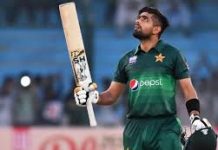World powers are continuing private talks in Vienna aimed at reviving Iran’s 2015 nuclear deal but disagreements between Iran and the West have kept on spilling into public view.
In a tweet early on Tuesday, Iran’s chief negotiator wrote that some counterparts still “persist in their blame game habit, instead of real diplomacy”.
Ali Bagheri Kani added that “diplomacy is a two-way street”, suggesting that the three European signatories to the deal – France, Germany, and the United Kingdom – and the United States, which unilaterally abandoned the accord in 2018, lack the political will to reach an agreement.
This came shortly after senior diplomats from the so-called E3 said they still have not “been able to get down to real negotiations”.
“Time is running out. Without swift progress, in light of Iran’s fast-forwarding of its nuclear programme, the JCPOA will soon become an empty shell,” they warned in reference to the formal name of the accord, the Joint Comprehensive Plan of Action.
US Secretary of State Antony Blinken said that diplomacy remained the best option but warned that Washington was “actively engaging with allies and partners on alternatives”.
After waiting for a year following the US withdrawal and the imposition of harsh sanctions, Iran gradually boosted its nuclear programme and is now enriching uranium up to 60 percent and employing advanced centrifuges.
But the International Atomic Energy Agency (IAEA) has confirmed that the country does not enrich uranium to the 90 percent purity required for a nuclear bomb, and Iran has consistently maintained that it will never seek a nuclear weapon.
The seventh round of talks to restore the JCPOA in the Austrian capital began on Thursday following a week-long pause. Prior to the pause, Iran presented two documents containing its proposals, which the E3 – which conducts shuttle diplomacy between American negotiators – rejected as incompatible with the terms of the deal.
Iran has said it has also prepared a third document on its demands for the verification of sanctions-lifting and guarantees the US would not renege on the JCPOA again, which will be presented after an agreement is reached over the initial two texts.
Many bilateral and multilateral meetings have been held in Vienna, both at the level of chief negotiators and expert workgroups. Another meeting of the JCPOA Joint Commission could come before the weekend, but no date has been officially confirmed.
In a tweet late on Monday, Russia’s chief negotiator, Mikhail Ulyanov, said “numerous” issues remained but all sides were working to bridge these gaps.
Iran’s Foreign Minister, Hossein Amirabdollahian, had a phone conversation with his Russian counterpart, Sergey Lavrov on Monday, in which he urged negotiators to propose more initiatives in the talks.
According to Iranian and Russian readouts of the call, Lavrov told him all US sanctions that are “inconsistent with the JCPOA and UN Resolution 2231” which underpins the deal must be removed, adding that diplomatic creativity and patience are the keys to achieving an agreement in Vienna.
Amirabdollahian also had a phone call with Germany’s new Federal Minister for Foreign Affairs Annalena Baerbock, but an Iranian foreign ministry readout of the call made no mention of the nuclear deal.
Iran maintains that all sanctions imposed since 2018 must be lifted, whereas the US wants to keep it in place some human rights and “terrorism” sanctions that were imposed both by Trump and his successor in the White House, Joe Biden.
The Biden administration has maintained the pressure on Iran by putting in place sanctions. Last week the US imposed new sanctions which prompted Iranian negotiators to criticise the approach in Vienna.
UN Secretary-General Antonio Guterres called for an end to the US unilateral sanctions on Iran in order to ensure full implementation of Resolution 2231 in his latest report on the subject to the UN Security Council on Monday. The report will be discussed during a Tuesday meeting of the council.
Meanwhile, Israel, a vehement opponent of the nuclear deal, continues to push for military action against Iran, whose military commanders have said they are ready to defend and reciprocate any potential attack.









